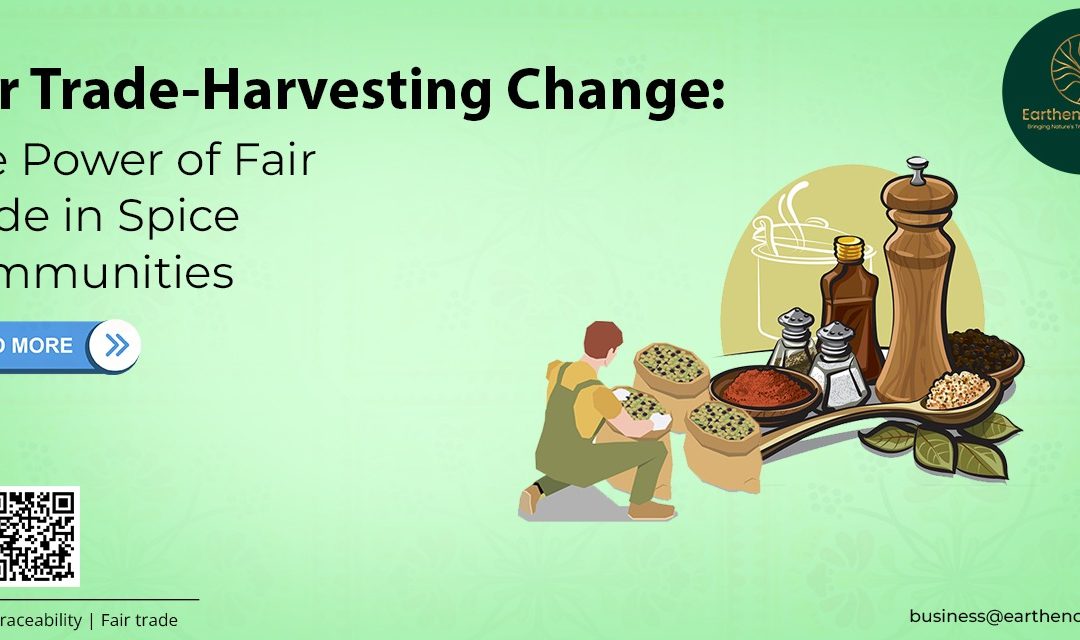Spices have long been the vibrant center of culinary traditions, giving food preparations flavour, aroma, and colour. But getting spices from farms to our kitchens is difficult, especially for the farmers who grow these valuable crops. Fair trade practices have become increasingly crucial in spice communities in recent years. This blog examines how Fairtrade initiatives have changed the lives of spice farmers, their communities, and the international spice trade.
A Glance at the Spice Industry
Millions of farmers labour tirelessly to produce several spices, including pepper, cinnamon, cardamom, and cloves, essential to the world’s agriculture. Many spice farmers face serious obstacles despite the demand for these necessary ingredients, such as unstable market prices, limited access to resources and weak bargaining power in the supply chain.
The Rise of Fair Trade
Globally, fair trade practices have become a ray of hope for farmers who grow spices. By guaranteeing that farmers and labourers get a fair price for their goods, the Fairtrade certificate seeks to enhance the lives of these parties. Companies acquire Fairtrade labels when their products adhere to stringent guidelines for social and environmental responsibility, such as equitable pay and working conditions, environmental sustainability, and safe and healthy working conditions—are given the fair trade label. Fairtrade seeks to establish a more sustainable and equitable trading system. It benefits farmers and their communities. Thus, the movement has gained traction in the spice industry.
Economic Empowerment
Farmers’ economic empowerment is one of fair trade’s main benefits in the spice communities. To give farmers a steady income stream that enables them to make investments in their farms, children’s education, and health care, fair trade organisations work closely with farmers to set fair prices for their goods. In areas that produce spices, fair trade promotes resilience and self-sufficiency by ending the cycle of poverty.
Community Development
Fairtrade programs support the general growth of spice communities in addition to empowering individuals. Buildings for infrastructure, schools and hospitals are just a few community projects that frequently receive funding from fair trade premiums. This all-encompassing strategy improves everyone in the community by having a positive knock-on effect.
Environmental Sustainability
Environmental sustainability is prioritized in fair trade practices within the spice industry. By following environmentally friendly practices, farmers lower the ecological impact of growing spices. Fairtrade guarantees the long-term sustainability of spice production without jeopardising the planet’s health by promoting sustainable farming practices.
Cultural Preservation
Communities’ cultural identities are frequently closely linked to spice farming. Fair trade supports the preservation of traditional farming methods and indigenous knowledge. Fairtrade initiatives in spice-producing regions are further enhanced by this cultural preservation.
Conclusion
In spice communities, harvesting change through fair trade is potent and transformative.
Earthen Connect, the leading aggrotech company, is committed to fair trade in organic food products. Here, we think we can help build a better future for farmers and the environment by collaborating closely with them and ensuring they get paid fairly for their produce. In addition to paying fair wages, we invest in the communities where our products are grown and support programs that advance environmental preservation and sustainable agriculture as part of our commitment to fair trade.
By choosing Earthen Connect, you can support the ethical and sustainable movement and build a better future for farmers and the environment. Our products are not only good for you, but they also support fair wages and working conditions for farmers and labourers, as well as environmentally responsible farming practices. Taste the difference in food sourced mindfully, and sign up with Earthen Connect to join the movement.

